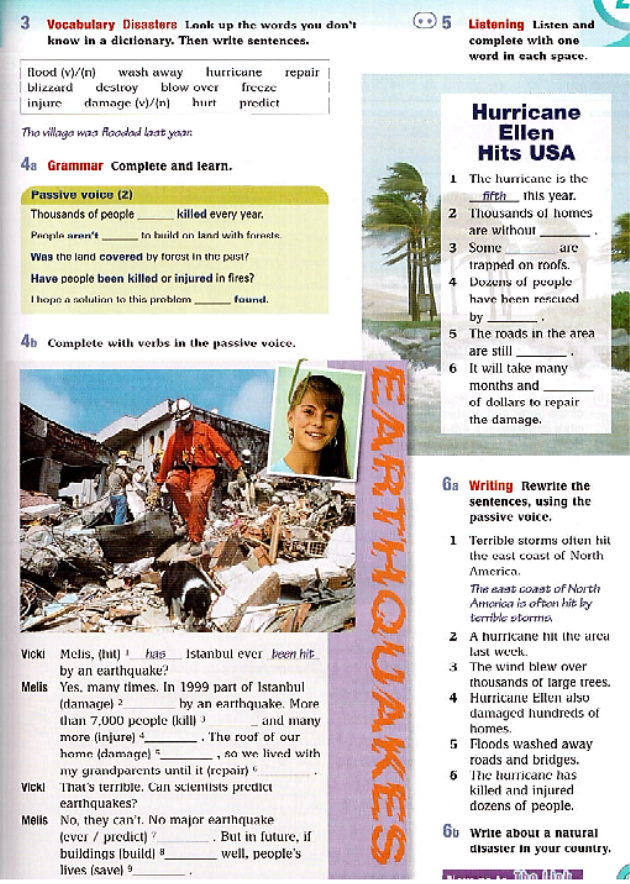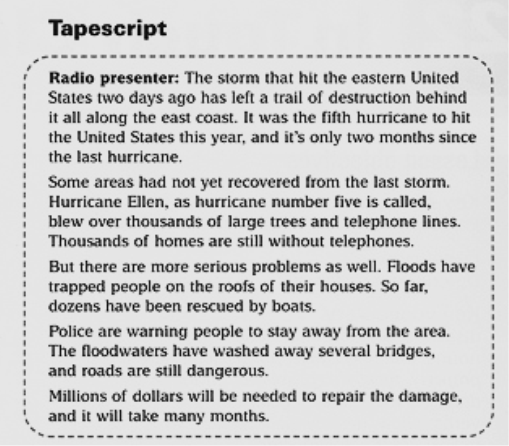Lesson Plan for the 7th grade "Natural Disasters"
Lesson Plan for the 7th grade "Natural Disasters" is aimed to develop listening and speaking skills. Students will practise listening skills for gist and detail. They will be able to describe problems related to natural disasters.
- Activity 1 docx
- Activity 2 docx
- Activity 3 docx
- Activity 4 docx
- Показати всі файли
be trapped
hurricane
damage
flood
wash away
repair
rescue
destroy
blizzard
covering an area that is usually dry
a severe snow storm with strong winds
a violent wind that has a circular movement
remove or carry away
to damage something so badly that it cannot be used
If someone or something is trapped, that person or thing is unable to move or escape from a place or situation
to help someone or something out of a dangerous, harmful, or unpleasant situation
to put something that is damaged, broken, or not working correctly, back into good condition or make it work again
Activity 2.
Put events in the correct chronological order.
_ Police are warning people to stay away from the area.
_ Some areas had not yet recovered from the last storm.
_ It will take many months to repair the damage.
_ It’s only two months since the last hurricane.
Activity 2.
Put events in the correct chronological order.
_ Police are warning people to stay away from the area.
_ Some areas had not yet recovered from the last storm.
_ It will take many months to repair the damage.
_ It’s only two months since the last hurricane.
Activity 2.
Put events in the correct chronological order.
_ Police are warning people to stay away from the area.
_ Some areas had not yet recovered from the last storm.
_ It will take many months to repair the damage.
_ It’s only two months since the last hurricane.
Activity 2.
Put events in the correct chronological order.
_ Police are warning people to stay away from the area.
_ Some areas had not yet recovered from the last storm.
_ It will take many months to repair the damage.
_ It’s only two months since the last hurricane.
Read the sentences and decide if they are true or false:
- Hurricane Ellen was the sixth hurricane to hit the United States this year.
- The hurricane damaged telephone lines.
- Hundreds of homes are without telephones.
- There are some not very serious problems.
- It will take many years to repair the damage.
Activity 3.


Information about the class
|
There are 14 students in the class aged 12 to 13. I’ve been teaching these students for 2 years. They are well behaved. Most of the students feel confident to speak English. However, some of the students are quiet and shy. They feel uncomfortable to talk in front of the class. Nevertheless they all work in pairs or groups. |
Lesson aim(s)
|
Students will practise listening skills for gist and detail. They will be able to describe problems related to natural disasters |
Rationale
|
I have chosen a listening activity with authentic material because it is a convenient way of improving both students' listening skills and their confidence in a real situation. |
Language analysis (for lessons which include teaching vocabulary and grammar)
|
Form |
Meaning |
Pronunciation |
|
flood
blizzard
hurricane
wash away
damage
destroy
be trapped
rescue
repair
|
covering an area that is usually dry
a severe snow storm with strong winds
a violent wind that has a circular movement
remove or carry away
to damage something so badly that it cannot be used
If someone or something is trapped, that person or thing is unable to move or escape from a place or situation
to help someone or something out of a dangerous, harmful, or unpleasant situation
to put something that is damaged, broken, or not working correctly, back into good condition or make it work again
|
/flʌd/
/ˈblɪz.əd/
/ˈhʌr.ɪ.keɪn/
/wɒʃ əˈweɪ/
/ˈdæm.ɪdʒ/
/dɪˈstrɔɪ/
/træpt/
/ˈres.kjuː/
/rɪˈpeər/ |
Materials (referenced)
|
Coursebook (In Touch 3, Michael Macfarlane, Carol Skinner, Longman), handouts, video (https://www.youtube.com/watch?v=b9iz8FOO37I ), recording
|
Assumptions
|
Students have already learnt Passive Voice. They are familiar with the lexis of weather |
|
Anticipated difficulties |
Solutions |
|
Students may have difficulties with some of the vocabulary in the recording
|
Pre-teach some key vocabulary |
|
Speed of speaking might be a problem for students. The can’t control the pace at which the speaker speaks |
Repeat the recordings several times, pause and ask comprehension questions. |
|
There might be some technical problems such as a power cut or computer might break
|
Read a text on my own |
Board Plan
|
Topic of the
Key words flood blizzard hurricane wash away damage destroy be trapped rescue repair
|
lesson
/flʌd/ /ˈblɪz.əd/ /ˈhʌr.ɪ.keɪn/ /wɒʃ əˈweɪ/ /ˈdæm.ɪdʒ/ /dɪˈstrɔɪ/ /træpt/ /ˈres.kjuː/ /rɪˈpeər/
|
Students’ ideas of consequences of natural disasters
Error Correction
Homework Ex.6b, p.69 |
|
Stage |
Stage aim |
Procedure |
Inter-action |
Time |
|
Lead-in |
To create interest in the topic of the listening text |
Students watch the video and try to guess the topic of the lesson. I elicit the answers from them. Then I ask students to tell more problems that people face nowadays. |
o/c |
4mins |
|
Feedback |
To get students to share ideas and to set context for listening activity |
I nominate students to feedback to the class |
S-S |
2 mins |
|
Pre-teaching vocabulary |
To help students understand the recording |
I put students in pairs. I ask them to do activity 1. They have to match the words with their definitions. I ask CCQs to check if students have understood them. (Is flood a large amount of water covering an area that is usually dry? Does to wash smth away mean to remove or carry smth away? Is hurricane a noun or a verb?) I drill some difficult words like earthquake or rescue.
|
S-S T-S |
4 mins |
|
Preparation for listening |
To prepare students for gist task |
I tell students about natural disasters that happen all around the world and ask them to think about the terrible results people can have. I elicit from students answers. I put some of the ideas on the board.
|
o/c |
4 mins |
|
Instruction giving to gist task |
To set up gist listening task |
I explain students that they are going to hear a news report about a hurricane. I ask them to do activity 2. Students order events in correct chronological order as they appear in the listening text. I ask ICQs. |
o/c |
1min |
|
Listening for gist |
To introduce students to the text and help them to get a general understanding |
I play the recording once. I ask to compare their answers in pairs |
S-S |
2 mins |
|
Feedback |
To check students’ general comprehension |
I check answers with the whole class. |
o/c |
2mins |
|
Listening for specific information |
To train the students to hear everything and to identify individual words. |
Students are going to listen again and do ex.5 p.69 in their coursebook. They have to complete sentences with one word in each space. |
S-S |
2 mins |
|
Feedback |
To check specific comprehension |
I conduct whole class feedback |
o/c |
2 mins |
|
Listening for detail |
To help students develop a more detailed understanding of the text |
Students listen to the recording and do activity 3. They have to decide if the sentences are true or not. |
S-S |
2 mins |
|
Feedback |
To check more detailed comprehension |
I check answers with the whole class. |
o/c |
2 mins |
|
Freer practice |
To provide an opportunity for students to practise the language in a more authentic context |
I give out copies of activity 4. I divide the class into two groups A and B. Students in group A should prepare the questions. Students in group B should work out the answers. Then I put students into pairs, As and Bs. Students role-play the journalist and the witness and talk about the hurricane. The journalists have to remember the key facts about the hurricane from their interviewees. I monitor, help weaker students and make notes of mistakes. I ask some pairs to feedback to the class.
|
S-S o/c |
15 mins |
|
Whole-class Feedback Error correction |
To give useful feedback on the students’ language performance
|
I tell the class what students did well. I write on the board good examples and bad examples of the language. Students correct themselves.
|
o/c |
2 mins |
|
Homework |
To provide further consolidation |
I tell the class to write about a natural disaster in their country |
o/c |
1 min |



про публікацію авторської розробки
Додати розробку
